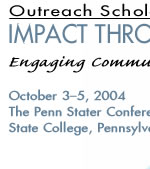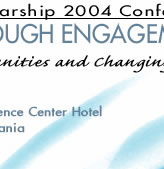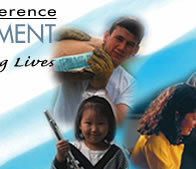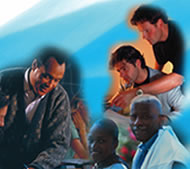|
|
|
Mindy Wright
|
|
|
|
Nancy Nestor-Baker
|
How Academic Disciplines Shape Faculty Views and
Involvement in Engagement
Mindy Wright, Department of English,
Ohio State University
Nancy Nestor-Baker, Office of Academic Affairs,
Ohio State University
Karen Bruns, Leader, OSU Extension and University
Outreach, Ohio State University
Each academic discipline has its own theoretic background,
language, and cultural norms that influence how engagement
is embedded into the day-to-day functions of the department.
This session will focus on understanding the uniqueness
of each discipline's discourse community and the impact
that has on shaping faculty views and involvement in
engagement. The session will include discussions concerning
the effect disciplines can have on acceptance of engagement,
language used to think about civic engagement, and means
for evaluating engagement.
Using
Grants to Achieve High Impact
Karen Bruns, Leader, OSU Extension
and University Outreach, Ohio State University
Kristine Campbell, Assistant Chancellor, Public
Engagement and Institutional Relations, University of
Illinois
Julie Ellison, Director of Imagining America,
University of Michigan
Many institutions have used seed grants to foster and
build university engagement. The effect these grants
have on achieving quality and sustaining impact is dependent
on how the programs are strategically and systematically
developed. Does the university community perceive the
grants differently if they originate from different
units (academic, research, or outreach)? How does shaping
the granting process shape the perceptions about the
seed grants program? This session will focus on discussing
key questions related to developing and implementing
the appropriate systems and evaluations for maximizing
the long-term impact of grants programs.
Creating an Institutional Culture and Commitment
to Evaluate Impact
Nancy
Ellen M. Kiernan, Program Evaluation Specialist, Penn
State University
Theodore R. Alter, Associate Vice President for Outreach
and Executive Director, Cooperative Extension
The Pennsylvania State University Institutions that
conduct multiple educational programs face challenges
in demonstrating impact. Faculty can know subject matter,
but lack evaluation skills. Administrators can perceive
evaluation as an unnecessary expenditure. Needed is
an institutional value on evaluation. In creating an
evaluation Web site, Extension used an inexpensive,
efficient technology to forge institutional commitment
to evaluation and stimulate use of valid evaluation
strategies.
Planning for High Impact as an Outreach Scholar
Rita
N. Saathoff, Associate 4-H Department Chair and Regional
4-H Agent, Rutgers Cooperative Extension
Ginny Powell, RCE Assistant Director and 4-H Department
Chair, Rutgers Cooperative Extension
This
session will highlight a successful program development
model used by Rutgers Cooperative Extension field faculty
to plan outreach scholarship programs that yield high
impact results both in their communities and as scholars.
Participants will learn how to incorporate effective
outreach strategies with scholarly work to produce success
every time.
Strange Bedfellows Sometimes Make the Best Friends
Patricia Takemoto, Assistant Vice Chancellor, University
of Wisconsin-Extension
Jenni Bugni, Outreach Manager, University of Wisconsin-Oshkosh
Carie Goral, Director, Wisconsin K-16 AmeriCorps*VISTA Service-Learning Project,
Wisconsin Campus Compact
Although
community service is integral to the missions of most
colleges and universities, it is a fine art, at best,
to develop strong and sustainable community-campus partnerships.
Session participants will work with a resource guide
that demonstrates how two of higher education's best
resources--the outreach/extension unit and the service
learning (campus compact) office--can support campuses'
service learning programs and help meet their civic
engagement commitments.
Becoming Bedfellows: Accreditation and Engagement
Lorilee
R. Sandmann, Co-Director, National Clearinghouse for
the Scholarship of Engagements, University of Georgia
Edward Jones, Associate Vice President for Academic Affairs and Dean of Extended
Services, University of Southern Indiana
Julie E. Williams, Associate Vice President Research
and Outreach Scholarship, University of New Hampshire
This
session features cases under differing accreditation
commissions where engagement was a thematic area of
institutional review although they were differently
focused and presented. Dual perspectives will be presented--from
preparing for institutional review to those responsible
for accreditation evaluation.
The SMILE Program: A Model for School-University Partnerships
Eda
Davis-Butts, Director, Oregon State University
SueAnn I. Bottoms, Assistant Director, Oregon State
University
This
session highlights a program with a focus of increasing
the number of underrepresented/underserved students
graduating high school, prepared to enter college. This
session should benefit those involved in community-university
collaborations, practitioners providing direct service
in P-12 outreach, and those interested in the success
of underrepresented students.
Putting the Neighbor Back in the Hood: Building Community
through a Collaborative Multicultural Festival Project
Susan
L. Hutchinson, Assistant Professor, The Pennsylvania
State University
Kerry Vachta, Associate Director for Community Based
Research, Penn State Harrisburg
Kler Jones, Community Organizer, Firm Foundation of
PA, Inc.
Elaine Burns, Coordinator, Harrisburg Weed and Seed
AID/TALL, Community Action Commission
Missy Saracino, Student, The Pennsylvania State University
The
purpose of this presentation is to describe the outreach
efforts undertaken by Penn State faculty and students
to work collaboratively with community leaders and youth-serving
organizations to plan and implement a neighborhood multicultural
festival in an ethnically diverse neighborhood in Harrisburg,
Pennsylvania.
Successes
and Challenges of Demonstrating Impact to Stakeholders
Patricia
A. Farrell, Associate Director, Michigan State University
Cheryl N. Booth, Co-Director, Michigan State University
Shruti J. Vaidya, Communications Director, Michigan
State University
Janet L. Bokemeier, Co-Director, Michigan State University
Documenting
substantive research impacts for key stakeholders not
only helps to strengthen university-community partnerships
and demonstrates the university's relevance to the state,
but also can influence future fiscal decisions. This
session focuses on how a university-wide coalition is
refining processes for tracking, documenting, and disseminating
the impact of engagement efforts.
Rural
Leadership Program Aims to Strengthen Rural Communities
Marie
G. Hvidsten, Rural Leadership Specialist, North Dakota
State University
Learn
about the framework of a statewide leadership program
that prepares and develops effective leaders to strengthen
rural communities in North Dakota. Hear about the details
of the two year interactive, dynamic leadership program.
Share your ideas on critical elements in a leadership
program.
|





